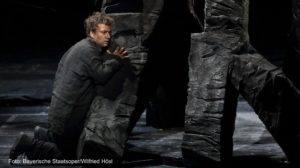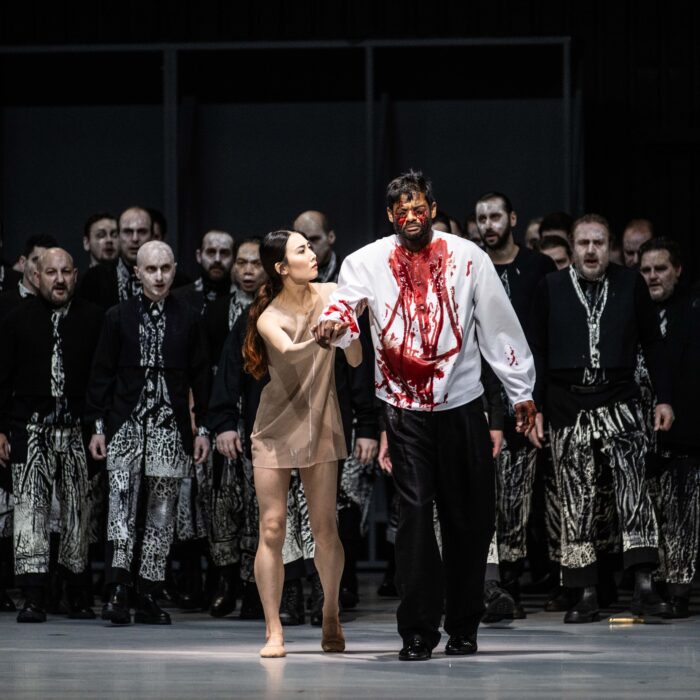
Bayerische Staatsoper 2017-18 Review: Parsifal
Jonas Kaufmann, René Pape Lead Marvelous Cast In Transcendental Production
By Lois Silverstein“Parsifal. Parsifal.”
Real? Dreamed? Which? In the opening of the Bayerische Staatsoper Opernfest 2018, we couldn’t tell.
The new production by Pierre Audi and Georg Baselitz, which featured Jonas Kaufmann, René Pape, Christian Gerhahar, Nina Stemme, Wolfgang Koch, and conductor Kirill Petrenko, took us to a world far-beyond the drizzly night outside the doors, and watched a human and sacred tale that raised similar questions. Set in a nameless wood, Baselitz and Audi combined the ordinary with the fantastic to explore them; it is reminiscent of Dante’s “Wood of Error,” and Shakespeare’s “The Tempest,” where exploration and recreation of community life occurs. Here are trees that turn fuchsia when nature moves from wasteland blacks, greys, deep browns; bones that shelter; castles that collapse as evil is overcome. The Knights of the Brotherhood can only survive when the sins of their leader, Amfortas, are redeemed; and that can happen only when what was sinful and upside down, was righted. (e.g. Baselitz painted curtains of upside down figures).
But how? Through Parsifal, the wise fool, whose innocence transformed the scourged land and its community into the noble and the light. Costumes by Florence von Gerkan, Light by Urs Schonebaum, in addition to the set design, created the visuals for such transformation to occur. In fact, the imaginative creations brought another dimension to it, e.g., both the Flower Maidens with their body suits of pastel with sagging breasts, garishly nippled, and protruding bellies, scored with dark hairs, and the Knights with their lopsided backsides and thighs, where a swan was a pile of rags instead of feathers, and armor derived from contemporary video games. It took no conventional method to accomplish such a goal. The wood was Nowhere, Anywhere, Everywhere; this is an Everyman drama. When Parsifal wrested the spear from Klingsor, evil fell, and so did the white-black-tiled “walls” of the castle collapse.
Kirill Petrenko paced the orchestra with grace and apparent ease. Never flagging in what could become overly brooding and occasionally ponderous;, Petrenko kept the orchestra moving; he dove right into the textural densities with finesse, with energy, supporting and guiding with light-like strokes; he received as many curtain calls as the whole cast, and rightfully so. The master was the lynch pin from which all the magic evolved.
Needless to say, the singers lit the whole.
Apparent Spontaneity & Fastidious Care
Nina Stemme, world-famous Swedish Soprano, sang Kundry. In Act one, she rolled out from under the cave of bones, offering her balsam to Gurnemanz. In Act two, she moved from Klingsor’s slave to sultry seductress, her maneuvering of Parsifal did not become predictable or contrived. In Act three, when she surrendered, she became soft almost, benign. She performed with apparent spontaneity, as if effortlessly, her vocal range wide and broad, her sound sinuous and coaxing, the trajectory of a wild, mad, guilty being who startled even herself with shrieks and yelled “Ich lachte, Ich lachte.”
Christian Gerhaher, Amfortas, played the wounded and guilty leader of the Knights’Brotherhood with fastidious care. Pain and suffering dominated his movements – slow limping and staggering throughout, his voice, especially at the outset, introspectively focused. It didn’t project as far as needed, perhaps, yet it conveyed the depth of his guilt and pain. When he dramatized the rage at Titurel’s burial, his eyes glared, his mouth contorted, his arms flailed, his legs relentlessly staggering, then resulting in his falling on Titurel’s burial mound, he satisfied for volume as well as for depth.
Rich Solemnity
René Pape sang Gurnemanz with rich solemnity, as always. He was ever the guardian and wise leader never veering from his role as central tale teller and unifier of the disparate angles of the story. His voice streamed even through the long narrative of the first Act and the exposition of the last one, where he thoughtfully accepted his own weaknesses viz – a – viz sending Parsifal away, and then moved into the compassion with which he brought him back into the Brotherhood.
But, most notable were his interactions with Parsifal, the intimacy he brought to their dialogues, the depths of it, the caring. When Parsifal leaned back into the arms of the embracing Gurnemanz, we fell back ourselves, cared for; when he covered Parsifal’s eyes, we too felt protected, It was eloquent.
Then too, in the final act, when he took his place at the feet of the new leader of the Brotherhood, we were in the arms of someone with absolute respect and dignity. That Pape could sing all this let alone with singular beauty, his voice articulating one fragment of information after another, and never losing its threads, was thrilling, even as it was long.
Klingsor, Wolfgang Koch, dynamic and witty, appropriately despicable, appeared seated in front of the curtain the true villain, right before the Flower Maidens appeared. He proved an apt visual contrast as well as a vocal one to the harp-like voices about to come.
The Star of the Night
Jonas Kaufmann, Parsifal appeared first in simple guise and with aplomb fell downstage front hugging his prize catch, the swan, worried and protective. Apart from the few lines he sang in the first act, he still made his presence felt: he roamed the stage watchfully, behind the knights, from tree to tree, sideways, forwards, in what was going on with deliberate and calculated observation. Observer and student he was, leading our attention to what counted, so we too became wise fools.
By Act two, and his rendezvous with Kundry, he was perhaps less foolish, but only by degrees. His “discovery” of the Flower Maidens was an insightful piece of acting: especially costumed as they were never did he gawk or gape, never touch or smile. Right under a somewhat neutral surface, he picked and chose each gesture to suggest feeling. Yes, he spoke of their sweet smell, their loveliness, but never did he venture beyond the suggestion of desire. Even with Kundry, he chose to suspend rather than exert strong feeling, playing naivete on the brink, not without desire. His responses resembled someone who followed a dance partner rather than taking the leadership role. It was apt as well as precise. In fact, when he emerged from his “fall” into their kiss, his “Amfortas, der Wunde” burst with sound and feeling that not only declared his smoldering feeling, but also showed the shock of awareness and recognition. His voice rang out clarion, full, resonant, beautiful, and shot through with intense pain. Would that we could coax such such awareness from ourselves through our own life trials.
As he proceeded, however, he did not seem to stay explicitly consistent: will he/won’t he? Kundry too didn’t know. However, he chose that path, keeping the whole encounter more real. When in the final Act, he assumed his more sacred role, blessing and baptizing Kundry, he did so with humility, and without sanctimoniousness. Was he even singing? It was seamless.
Then too, when they sat on the floor as a couple, then, when Gurnemanz joined, as three, they became a family, a holy family, a trinity, foreshadowing what would come in the finale, part of a community of beings wrapped in a human embrace.
Magical All Around
If Wagner’s “Parsifal” is anything it is a story of profound self-recognition; the composer completed it after over 40 years of contemplation and creating his other masterpieces. It was his last creative work, and a music drama that the Munich production played largely as he intended, as part sacred pageant. When the final curtain came down, in fact, it felt wrong to clap. And yet, we did, and stamp, and clap, for more than 20 plus minutes. The subject resounded: We are who we are and there is no getting away from it and we must do all we can to live it thoroughly: Gurnemanz banished the young Parsifal when he knew better; Amfortas “sinned” when, bound by another code, his senses drove him; Klingsor relished outright evil rather than subdue it; Parsifal, step by step, shedding like a snake, the skins of his ignorance and accepted the many dimensions of human dignity – it was a presentation of self-knowing and the steps toward it. Every note, every accelerando, every contrapuntal insert, voice, movement, compelled us to take it to heart. Spectators? Maybe. It would be more accurate to call us witnesses to our own foibles, faults, fractures. For some in the audience, the religious declaration of the final lyrics, may have offset the universality of “Parsifal’s” message; for others, it affirmed the progression of Christian symbolism and thus satisfied their affiliations. Whether we liked the white splashed scrim that fell at the finale, it allowed both a comet-like exit: the universe was now as harmonious as we hoped it would be, with Wagner’s breathtaking vision to guide us.


